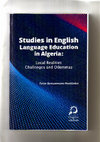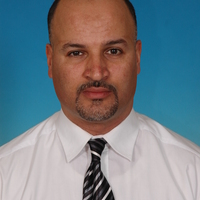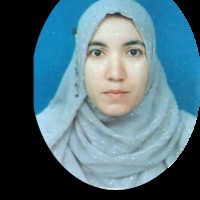Books by Maamar Missoum
Course Objectives: The overall objective of this course is to help students develop some key rese... more Course Objectives: The overall objective of this course is to help students develop some key research skills for academic, professional and life purposes.

Studies in English Language Education in Algeria Local Realities, Challenges and Dilemmas , 2021
Finding jobs is probably the most important issue university graduates worry about. Even when eco... more Finding jobs is probably the most important issue university graduates worry about. Even when economy is booming, many graduates fail to find a job related to their university training. Besides, economic globalisation has imposed on graduates both local and global competition for jobs. In Algeria, in return for considerable financial investment, universities are expected to prepare young citizens for professional careers. The focus of this research is geared towards the agendas held by teachers for developing, in their students, some key employability requirements or professional competencies. This paper reports on a study conducted in the context of departments of English in some Algerian universities. In addition to content analysis of current syllabi, a survey questionnaire was used to tap into teachers’ attitudes and practices vis-à-vis developing students’ employability. Forty-nine (49) teachers from English departments in fifteen (15) universities completed and returned the questionnaire. Quantitative and qualitative analyses of the data yielded some interesting insights into the surveyed teachers’ agendas for developing graduates’ employability. Some key employability skills appear to be surprisingly low on the teachers’ agenda. These findings were tentatively turned into some suggestions, particularly addressed to teachers in Algerian English departments, in order to promote the training of graduates who can both fit in the labour market as well as have the potential to transform it. Universities can and should help their communities face the local realities especially of the socio-economic environment as well as the increasing global challenges.

EXPLORING TEACHERS’ AGENDAS FOR LEARNER AUTONOMY, 2021
Education is a means to ensure the welfare of societies. To do so, it has to train learners to be... more Education is a means to ensure the welfare of societies. To do so, it has to train learners to become citizens who contribute to the welfare of their society and their own. Developing learner autonomy enables learners with attitudes and skills to achieve this goal. Research has shown that more autonomous learners are better learners. Teachers are expected to play a critical role in this training. The present research that was conducted with seventy-one (71) teachers and two hundred and thirty (230) students from the English Department of the Blida 2 University, Algeria explores teachers’ agendas for learner autonomy so as to inform educational reforms seeking to foster autonomy. To achieve this aim, four (04) research tools were used, a questionnaire, class recordings of teachers’ lectures, teachers’ corrective feedback on students’ MA dissertations and exam papers and teachers’ course descriptions. After quantitative and qualitative data analysis, the findings reveal that developing learner autonomy is not high on the agendas of many teachers, students, educational and political leaders. Despite their widespread positive beliefs about learner autonomy, teachers’ instruction for learner autonomy seems to be a rather rare practice. The teachers seem to suffer from environmental factors especially lack of social consideration of their role and poor management of education and society at large. This situation might have discouraged teachers and learners from engaging fully in educational reforms. In the light of the insights from the present research, suggestions are offered for fostering and sustaining teachers’ capacity to develop learner autonomy (especially through training) and improving environmental readiness to support positive teachers’ agendas for learner autonomy. These suggestions may contribute to convince and enable teachers to hold developing learner autonomy high on their agenda for the sake of better-educated citizens and ultimately a Nation blessed with freedom and prosperity.
Key Words: Learner Autonomy - Teacher’s Agendas – Teaching Strategies – Intrinsic and Extrinsic Factors – EFL in Higher Education
Conference Presentations by Maamar Missoum
4 Chères collègues, chers collègues Bienvenue au colloque international-Les littéracies universit... more 4 Chères collègues, chers collègues Bienvenue au colloque international-Les littéracies universitaires: de l'analyse à la reformulation. Méthodologie et pratique. Ce colloque est organisé à l'initiative du département de français de l'université Lounici-Ali Blida 2. Il s'inscrit dans la continuité des séminaires, journées d'études et colloques organisés par la faculté des lettres et des langues et dont l'objectif est de dynamiser la recherche scientifique en Algérie. Cette manifestation scientifique a été soutenue sur les plans financiers, logistiques et matériels par l'université de Blida 2 et de manière cruciale, par l'IFEG (l'institut de formation d'électricité et de gaz), Tonic emballage, Orangina Algérie et Ital CREM.

Finding jobs is an important issue that many university graduates worry about. Even when economy ... more Finding jobs is an important issue that many university graduates worry about. Even when economy is booming, many graduates fail to find a job related to their university training for years after their graduation. In return for big financial investments, universities are expected to prepare young citizens to fit into existing jobs as well as create new ones. The aim of this paper is to explore the contribution of universities to training students in skills that could increase their employability. This paper reports on a study conducted in the context of departments of English in various Algerian universities. The focus of this research is exploring teachers’ agendas towards and their contribution to developing key employability requirements in their students. A questionnaire was used to tap into their attitudes and practices vis-à-vis developing students’ employability. It was administered to one-hundred and thirty-five teachers from English departments in twenty-eight Algerian universities. Twenty-seven teachers from fifteen universities completed the questionnaire. The analysis of the data indicates that many teachers either seem to lack awareness about employability skills or place these low on their agenda. These findings are turned into some suggestions to increase university graduates’ employability.
Key Terms: Employability Requirements - University Graduates – Life-Long Learning – Teaching strategies – Teachers’ Agendas – English Department - Algeria

Cognitivist approaches to learning languages have transformed the way educators look at the compl... more Cognitivist approaches to learning languages have transformed the way educators look at the complex journey of learning a foreign language by bringing new dimensions to this field. For years, behaviourism in psychology and structuralism in linguistics dominated views on how language, language learning and the learner should be perceived. Yet, exploration of the learner’s mental processes has unveiled a whole universe of capacities and strategies learners bring to their learning. As a case in point, this paper reports on a set of studies on strategies used by students at the University of Blida 2, Algeria. Effective learners employ strategies to perform learning tasks and achieve better attainment. The purpose of the present study was to examine EFL learners’ use of a selection of cognitive and meta-cognitive strategies. The researcher used seven research tools (analysis of the subjects’ course grades, classroom discourse analysis via direct observation of authentic lectures and analysis of class audio recordings, a test of lecture comprehension, a test of listening comprehension, analysis of the subjects’ lecture notes, two survey questionnaires for students and one for teachers and an analysis of instruction in listening and note taking in the English Department). These tools were used to triangulate the strategies the subjects use particularly in areas of academic listening and note-taking. The Findings seem to suggest that, although most of the subjects reported using efficient, many of them were using less efficient strategies. The role of teachers in fostering efficient and less efficient strategies has been examined. The data point to the possibility that teachers may be using some strategies that could foster less efficient learner strategies. Some suggestions are offered to help more students develop better cognitive and meta-cognitive strategies that will ultimately enable them to learn more efficiently.
Teaching Documents by Maamar Missoum
Introduction: Every research work requires using information from the literature about the topic.... more Introduction: Every research work requires using information from the literature about the topic. Thus, a researcher should be able to use the techniques that would enable him / her to make efficient notes of the most relevant quality information in a text; i.e. a good researcher must necessarily be a good note taker. Efficient notetaking for academic research requires the use of good strategies. Below is a suggested non-exhaustive list of note-taking strategies to try. Experiment with different strategies and see what works for you.
Learning Goals At the end of this unit, you (the student) should be able to 1. Demonstrate awaren... more Learning Goals At the end of this unit, you (the student) should be able to 1. Demonstrate awareness of the strategies you have been using for paraphrasing material from the sources you use; 2. Critically assess those strategies to maintain the efficient ones and stop using the inefficient ones; 3. Describe other strategies for efficient paraphrasing; 4. Record accurate useful information from sources using appropriate paraphrasing.
Learning Goals At the end of this unit, you (the student) should be able to 1. Demonstrate awaren... more Learning Goals At the end of this unit, you (the student) should be able to 1. Demonstrate awareness of the strategies you have been using for quoting material from the sources you use; 2. Critically assess those strategies to maintain the efficient ones and stop using the inefficient ones; 3. Describe other strategies for efficient quoting; 4. Record accurate useful information from sources using quoting appropriately.
To receive Email notifications from Mr Missoum: 1-Go to www.academia.edu; 2-Create your free acco... more To receive Email notifications from Mr Missoum: 1-Go to www.academia.edu; 2-Create your free account; 3-Search for 'Missoum'; 4-Click on 'follow Mr Missoum' Note Taking Strategies Learning Goals After covering this unit, you (the student) should be able to 1. Demonstrate awareness of the strategies you have been using for note taking; 2. Critically assess those strategies to maintain the efficient ones and stop using the inefficient ones; 3. Describe other strategies for efficient note taking in order to practise using them. Introduction: Every research work requires using information from the literature about the topic. Thus, a researcher should be able to use the techniques that would enable him / her to make efficient notes of the most relevant quality information in a text; i.e. a good researcher must necessarily be a good note taker.










Uploads
Books by Maamar Missoum
Key Words: Learner Autonomy - Teacher’s Agendas – Teaching Strategies – Intrinsic and Extrinsic Factors – EFL in Higher Education
Conference Presentations by Maamar Missoum
Key Terms: Employability Requirements - University Graduates – Life-Long Learning – Teaching strategies – Teachers’ Agendas – English Department - Algeria
Teaching Documents by Maamar Missoum
Key Words: Learner Autonomy - Teacher’s Agendas – Teaching Strategies – Intrinsic and Extrinsic Factors – EFL in Higher Education
Key Terms: Employability Requirements - University Graduates – Life-Long Learning – Teaching strategies – Teachers’ Agendas – English Department - Algeria
Pre-Requisite skills In order to succeed in this course, learners must have acquired a good ability to 1) Read texts effectively; and 2) Write essays.
Best Performers 2019-20 - Master 2 in Didactics
Congratulations!
There are students who worked hard but whose names do not appear in this list. I give them warm encouragement. Keep up the good work!
Congratulations!
Dans ce contexte, il est fondamental d'évaluer de quelle manière les innovations technologiques peuvent enrichir l'enseignement des langues et engendrer les inégalités d'accès ou d'appropriation. Cette réflexion mettra l'accent sur les solutions pour atténuer ces disparités, tout en examinant les nouvelles formes d'apprentissage qui se développent grâce aux outils numériques.
A l’ère du numérique, l’enseignement des langues pose des défis à la fois pratiques et théoriques. Les innovations actuelles promettent d'améliorer les pratiques pédagogiques, mais nécessitent une réflexion approfondie sur l'inclusivité, la formation des enseignants et la gestion des données personnelles. Les recherches futures devront tenir compte de ces multiples dimensions pour offrir des perspectives d’évolution adaptées aux réalités des apprenants et des éducateurs.
Advancing the same idea, Cundar-Ruano (2021) argued that students who learned and practiced critical thinking skills at school are more likely to succeed in coping with the society’s demands and modern life challenges (p.368).
One of the major facets of critical thinking as stressed by many research and conceptual literature is “Creative Thinking‟ (Coughlan,2008;Lau,2011;Caroselli,2011).Gladushyna (2019) explained that creative thinking is ‘generative’ involving original and innovative ideas, whereas critical thinking is “analytical, calling for deeper and more reflective thinking processes. In his turn, Lau (2011) stressed the tight link between the two concepts and how each of them inevitably calls for the other’s use. He argued: “We need creativity in critical thinking to come up with arguments, counter examples, and alternative explanations. And creativity needs critical thinking in evaluating and improving new ideas. They are both part of the essential thinking toolkit» (p. IX).
Fostering students’ critical and creative thinking skills requires innovative teaching methods and techniques. In this sense, classroom activities should revolve more around experiential learning, collaborative and interactive discussions, peer feedback, and problem-solving activities. All this can be achieved through a well-established curriculum that encourages learners’ active involvement in the learning process, and assigns the roles of being a guide, a facilitator and a prompter for the teacher. Put in the EFL context, Cundar-Ruano (2021) argued that teachers; and students endeavors in the EFL classroom should strive to stimulate students to use the language productively, so they can debate,analyze, criticize, evaluate, create, judge, and reverse their thinking” (p. 362). In the same line of thought, Alothman (2012) suggested that real-life problem-solving tasks should be included in EFL curriculum in an appropriate way to incite creativity.
With recent developments in ICTs (Information and Communication Technologies) and the integration of e-learning as a new method of instruction, it’s even more legitimate to claim for critical thinking and creativity in teaching and learning practices. Al Ghadouni (2021) explained that the reason why critical thinking is developed in e-learning is that the latter “gives the student the freedom to choose to read the sources and the ability to search and make sure of the validity of the information and data through reliable electronic sources and websites; this enhances evaluation skill” (p.118). It enables him/her to correctly use the skill of interpretation and the possibility of searching in such a source which increases his understanding. Additionally, it provides the possibility of dialogue with others, draws inference with valid and strong arguments and evidence.
We are pleased to extend this formal invitation to you to participate in the upcoming conference entitled "Fostering Effective Language Integration: Exploring English as a Medium of Instruction (EMI) Practices in Algerian Higher Education." The conference aims to bring together educators, researchers, and practitioners to explore and discuss the use of English as a medium of instruction in the context of Algerian higher education.
The conference will provide a platform for participants to share insights, experiences, and best practices related to EMI, with a focus on its impact on teaching and learning, curriculum development, and student outcomes. We believe that your expertise and contributions would greatly enrich the discussions and outcomes of the event.
We invite you to consider submitting a paper, delivering a presentation, or participating in panel discussions that align with the conference theme. Your involvement will not only contribute to the advancement of knowledge in this field but also provide valuable perspectives for our diverse audience.
We encourage you to share this invitation with your colleagues who may also have valuable contributions to make.
We look forward to your participation and to the opportunity to engage with you on this important topic. Should you have any questions or require further information, please do not hesitate to contact us.
Thank you for considering this invitation, and we hope to welcome you at the conference.
Sincerely,
The Conference Organizing Committee
•The relationship between games and learning
•A review of research on the application of educational computer games in EFL
•Case studies on digital game-based learning ( methods, models, strategies)
•Games for classroom-based learning
•Use of mobile games in the classroom
•How can game-based learning effectively engage learners
•Games that can reinforce language across the four skill areas
•Designing curricular games in ESP English
•Gamification-based techniques to promote learners
•Identifying types of digital games
•Assessing engagement in game-based learning
Through this conference, we will try to analyze key challenges that teachers and learners face in classrooms and suggest a way of integrating soft and hard skills. Our aim is to bring researchers to study the existing ESP literature in terms of presence of global issues, explore the perceptions of global issues among university students, outline the correlation between professional skills and global competence, and enhance the teaching of ESP in this field. We will not only expose our work but also discuss the future of English for Specific Purposes, and suggest ways to use it effectively in their field of study for scientific purposes.
challenges related to difficult working conditions especially a
high student-teacher ratio to require that learners assume higher
responsibility for their own learning. For reforms that emphasise
learner autonomy to succeed, both learners and teachers’ attitudes
towards autonomy need to be favourable. This research
investigated how learner autonomy is conceived by teachers and
students in some Algerian English departments. A survey
questionnaire was administered to35 teachers and 130
students. The results seem to indicate that the surveyed teachers
and students hold positive attitudes towards learner autonomy and
its effects on EFL student academic achievement. Nonetheless,
some uncertainty among teachers and learners emerged from the
data about the role of the English department and the wider
Algerian culture in developing learner autonomy. The researcher
attempts to argue that the attitudes and perceptions of
stakeholders must be taken into consideration in the preparation
and implementation of reforms in education. Some
recommendations are made to support reforms for the promotion
of EFL ‘learner autonomy’.
Keywords: Learner autonomy, teachers’ perceptions, teachers’
attitudes, learners’ perceptions, learners’ attitudes, culture,
educational culture, educational reforms, department of English,
Algeria
Exploring economical solutions to the EFL-ESP teachers’ challenge related to Syllabi
Rationale
Improving quality of ESP teaching and learning requires an appropriate syllabus that
1. Makes mission of EFL-ESP teachers more conducive to success;
2. Helps learners acquire functional English language skills for academic and professional purposes